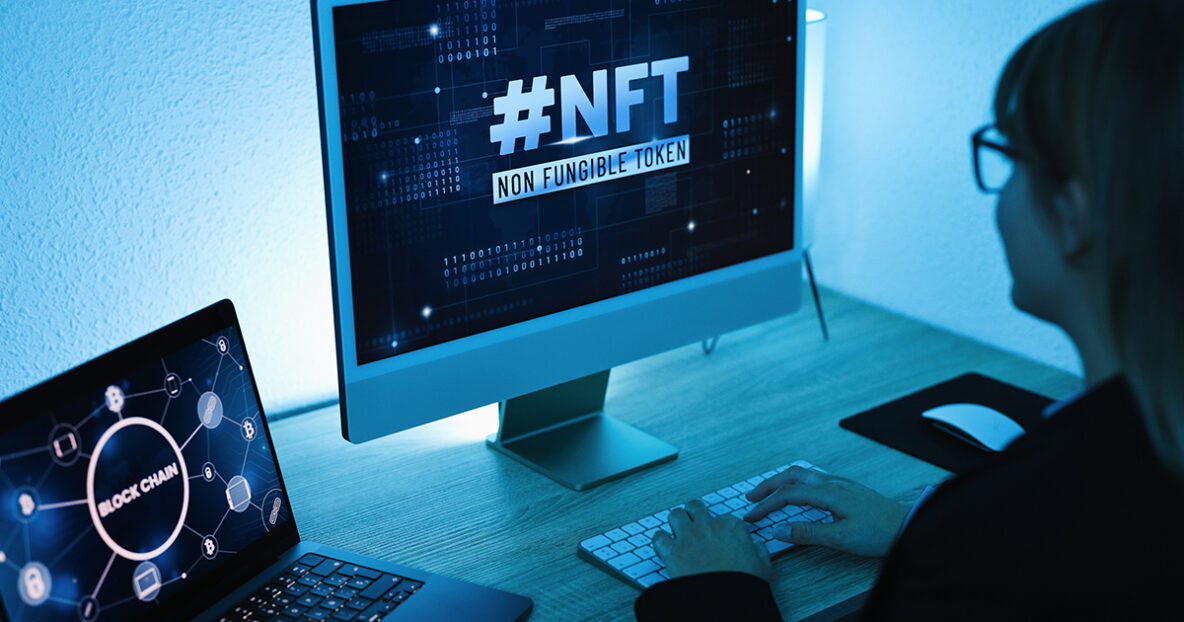Stories about cryptocurrency and non-fungible tokens (NFTs) are popping up left and right in the news. From the purchase of a piece of digital art through Christie’s Auction House for $69.3 million to the push to pay taxes with crypto, digital currency is everywhere—and creating new opportunities for law firms.
Understanding NFTs and cryptocurrency
Before we jump in, it can be helpful to establish some definitions for cryptocurrency, NFTs, and another term that gets thrown around a lot: blockchains.
Cryptocurrency, such as Bitcoin, is digital currency that is verified and recorded by a decentralized ledger, or blockchain technology. Instead of relying on a bank or government, blockchain information is stored on thousands of nodes around the globe, each of which constantly validates and updates transactions on the blockchain.
NFTs are digital assets, the information for which is validated and recorded on the blockchain. Fungible means there isn’t a difference between two items. For instance, the dollar bill in my hand is interchangeable with the dollar bill in your hand.
Most cryptocurrency is fungible. NFTs, on the other hand, are non-fungible, meaning that just like an original piece of artwork, each one is completely unique. And because of their uniqueness, NFTs are now being used to represent physical objects, like art and real estate.
Why NFTs are different
The uniqueness of each NFT marks a shift in cryptocurrency. Because blockchain transactions are verified, it is possible to validate the authenticity of an NFT, even if it has gone through many transactions. And unlike a piece of art, an NFT can’t physically be destroyed.
But what seems especially important here is that because NFTs are unique, they create a situation of scarcity. This is what allows them to represent physical objects and gain value as collectors’ items.
Practice areas impacted by NFTs
Because NFTs are so new, related areas of law will continue to grow and change. But they are already being used to represent things like art, real estate, collectibles, event tickets, sports moments in digital card form, the first-ever Tweet, and intellectual property.
Real estate
NFTs hold the potential to make real estate more liquid. Instead of going through a series of less efficient practices to lease or buy a property, NFTs significantly streamline the process.
Although NFTs can’t be broken down into sub-assets, fractional ownership of NFTs exists. For investors, selling an NFT that represents an ownership portion of an investment property may seem more straightforward than the paperwork involved in selling to an interested buyer in the real world.
Strong legal contracts are essential in this new market, but because cryptocurrency is still new territory, lawyers will have some navigating to do.
Intellectual property
Intellectual property and patents already exist in databases, and now they are being represented by NFTs as well.
Using NFTs for intellectual property is useful for the same reasons that using NFTs for real estate is—it makes these rights more liquid and easier to sell. That’s a boon in the eyes of some patent owners, but they need law firms to draft legally enforceable and accurate contracts. (See above!)
Cybersecurity
Although NFTs are often hawked as being secure from physical hazards, they are still vulnerable to the loss of a physical record of a password—and to cyberattacks. And cyberattacks on digital assets can result in lawsuits.
While buying cybersecurity insurance is now common, policies may not cover NFT hacking events. It’s always a good idea for a company to carefully review its insurance policy and verify coverage.
Regulation and cryptocurrency
Questions have also been raised as to whether or not NFTs qualify as securities. Globally, more and more countries are looking at ways to regulate the cryptomarket. In the US, the current Securities and Exchange Commission (SEC) chair has indicated interest in increasing regulations for NFTs as a way to protect investors.
Although many people argue that NFTs are closer to collectibles, any changes here could send people scrambling for legal advice.
The road ahead
In just a few short years, NFTs have already impacted several legal practice areas, and their acceptance as representation for physical assets is growing.
We don’t know which practice areas will be affected next, but it’s worth keeping an eye on the latest developments in your areas of expertise.

